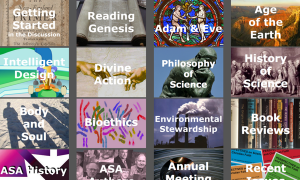 The issues surrounding science and Christian faith are huge. They seem complex and technical. It is tempting to search for short simple solutions and move on … or to ignore the issues all together. What do Christians with training and a background in science think about these issues? Where is the Christian leader, teacher or pastor able to turn to get started?
The issues surrounding science and Christian faith are huge. They seem complex and technical. It is tempting to search for short simple solutions and move on … or to ignore the issues all together. What do Christians with training and a background in science think about these issues? Where is the Christian leader, teacher or pastor able to turn to get started?
Wouldn’t it be useful to listen to Christian scientists discuss these issues?
The American Scientific Affiliation is a a network of Christians in the sciences that has been existence for some 70 years. Over this time the organization has fostered many discussions on science and Christian faith. These conversations have occurred at the annual meeting and in the pages of the ASA journal Perspectives on Science and Christian Faith (PSCF). Much of this material has been available on the web for many years, but access was often confusing and finding the desired material could be something of a hit and miss proposition requiring a bit of luck. I have found some very useful material in these archives (lectures by Francis Collins and Jack Collins for example, or an article by Richard Bube or Dennis Venema). But even returning to a previous find could be something of a challenge.
As part of the Evolution and Christian Faith program run by BioLogos and funded by the Templeton Foundation the ASA has organized and categorized a wide range of resources addressing questions of evolution and the age of the earth. These resources can be found through the link Resources on Science and Christian Faith. From the introductory page:
WELCOME to Resources on Science and Christian Faith from the American Scientific Affiliation. We have prepared mini-courses on a variety of faith and science topics using resources from our journal, Perspectives on Science and Christian Faith (formally Journal of the American Scientific Affiliation) and from presentations from our annual meetings. Click on one of the categories below to find readings, audio recordings, and videos that have been selected from our collection to introduce you to a particular topic. We encourage you to proceed through the collection in the order presented and write answers to the study questions in a personal journal. These study questions can also be used in a conversation with another person or in a discussion in a small group.
This is followed by a range of topics: Getting Started, Reading Genesis, Adam and Eve, Age of the Earth, Bioethics, … and so on.
This isn’t a monotone presentation covering only one view. There are unifying themes rooted in Christian commitments
The ASA accepts the Bible as inspired, trustworthy, and authoritative and thus disagrees with the “atheistic naturalist” who simply disregards the Biblical teaching. The ASA also believes that scientific investigation (and its results) are legitimate because God created and preserves the universe in such a way that it has contingent order and intelligibility. In other words the ASA discussion is among people who take both the Bible and science seriously.
But also strong disagreements.
The ASA does not take a position when there is honest disagreement between Christians on an issue. We are committed to providing an open forum where controversies can be discussed without fear of unjust condemnation. Legitimate differences of opinion among Christians who have studied both the Bible and science are freely expressed within the Affiliation in a context of Christian love and concern for truth. Consequently, you will find a range of views, some which disagree strongly with the other.
The resources available contain presentations and articles by William Dembski arguing for Intelligent Design and Hugh Ross arguing for a progressive creation approach, as well as presentations by Francis Collins and others arguing for evolutionary creation. Although there are a variety of Old Earth positions, there is relatively little from a young earth perspective … simply because there are not many scientists or scientific arguments that support this perspective (a fact that should cause many Christian leaders to dig a little deeper). From the page collecting resources on the Age of the Earth:
Most ASA members accept the consensus scientific view on the age of the earth. Already in 1949 based on radiometric dating techniques, ASA member Laurence Kulp said, “One of the most probable facts in geology, I believe, is that the earth is close to two billion years old…” Kulp’s early paper supporting the old earth position and criticizing YEC is featured in the collection below. A paper written for the ASA web site, “Radiometric Dating: A Christian Perspective” by physicist Roger Wiens has proved to be one of the most popular in terms of electronic downloads. Many of the resources here simply review the scientific claims for an old earth and then seek to understand that great age in light of what the Bible says. YEC have brought forward critiques of the various dating methods and conclusions drawn from them. Because ASA members have tended to accept the consensus view, the articles here summarize and engage the YEC criticisms. ASA members may disagree with the YEC position but acknowledge those who hold that view as fellow believers and worthy of respectful engagement. Randy Isaac’s review of the YEC RATE project and subsequent dialog with its authors illustrates this respectful engagement.
The YEC perspective isn’t absent however … but it is dealt with in a way that respects the scientific data and looks to fit it into this biblical interpretation.
The last group of papers deals with the idea of apparent age. Here, the earth/universe looks old, i.e. old age is the conclusion you would draw from the scientific data. Even Isaac, in his discussion of the RATE project, seems to allow this view as one with scientific integrity because it admits to the consensus view. Many reject the view because it undermines the idea that we can draw reliable conclusions from our observations or even trust God’s revelation to us in creation. Nonetheless, apparent age is a method of reconciling the scientific data with the perceived need for a young earth.
Anyone interested in tackling the scientific arguments for the vast age of the earth or the related theological questions is encouraged to study these papers and talks.
Hopefully this collection, now organized and accessible, will provide a valuable resource.
Who do you trust in the conversation of science and Christian faith?
Why? What makes a person trustworthy?
If you wish to contact me directly, you may do so at rjs4mail[at]att.net
If interested you can subscribe to a full text feed of my posts at Musings on Science and Theology.















